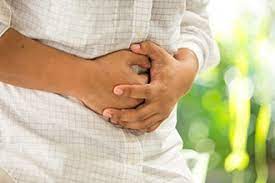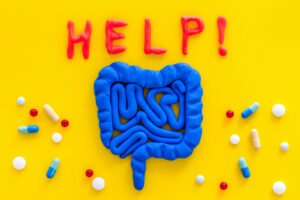When we think of constipation, we often associate it with digestive discomfort and bloating. However, what might come as a surprise to many is the potential link between constipation and hip pain. The human body is a complex and interconnected system, where one issue can sometimes lead to unexpected symptoms in seemingly unrelated areas. In this blog, we will delve into the relationship between constipation and hip pain, exploring the underlying mechanisms, causes, and potential remedies.
Contents
- 1 What Causes Constipation?
- 2 The Connection Between Constipation and Hip Pain
- 3 Exercises for Alleviating Constipation and Hip Pain
- 4 Medical Considerations To Treat Constipation and Hip Pain
- 5 Foods That Help Prevent Constipation
- 6 When to Seek Medical Attention
- 7 Creating a Digestive-Friendly Environment
- 8 Conclusion
What Causes Constipation?

Constipation is a common digestive issue characterized by infrequent bowel movements, difficulty passing stools, or the sensation of incomplete evacuation. It can be caused by a variety of factors, ranging from lifestyle and dietary choices to underlying medical conditions. Here are some of the primary causes of constipation:
- Diet Low in Fiber: A lack of dietary fiber is one of the most common causes of constipation. Fiber adds bulk to stools and helps them move through the digestive tract. Without sufficient fiber intake, stools can become hard and difficult to pass.
- Dehydration: Inadequate fluid intake can lead to dehydration, causing the body to absorb more water from the stools. This results in dry and hardened stools that are challenging to pass.
- Lack of Physical Activity: Regular physical activity helps stimulate the muscles in the intestines, promoting bowel movements. A sedentary lifestyle can slow down bowel motility and contribute to constipation.
- Ignoring the Urge: Ignoring the urge to have a bowel movement can lead to stool hardening in the colon, making it more difficult to pass later.
- Certain Medications: Some medications have constipation as a side effect. These include certain pain medications (opioids), antacids containing aluminum or calcium, some antidepressants, and anticholinergic drugs.
- Changes in Routine or Lifestyle: Traveling, changes in routine, or disruptions to regular meal times can impact the body’s natural bowel movement patterns, leading to constipation.
- Medical Conditions: Various medical conditions can contribute to constipation. These include irritable bowel syndrome (IBS), hypothyroidism, diabetes, Parkinson’s disease, multiple sclerosis, and certain neurological disorders.
The Connection Between Constipation and Hip Pain
Constipation and hip pain might seem like two unrelated issues, but there is a surprising connection between them due to the complex network of nerves, muscles, and tissues that make up our abdominal and pelvic regions. Let’s explore how constipation can lead to hip pain and the mechanisms involved in this connection:
- Nerve Interaction: The abdominal and pelvic regions are densely populated with nerves that serve both the digestive and musculoskeletal systems. When you’re constipated, the accumulation of stool in the colon can press against nearby nerves, causing referred pain. This means that you might feel discomfort in areas other than the colon itself – including the hips.
- Pressure and Discomfort: Constipation leads to the formation of hard, dry stools that are difficult to pass. As stool builds up in the colon, it can exert pressure on adjacent structures, including muscles and nerves that extend to the hip area. This pressure can result in pain that radiates from the lower abdomen to the hips.
- Muscle Tension: The discomfort caused by constipation can lead to muscle tension in the abdomen, lower back, and hips. This tension can contribute to hip pain, as muscles in these areas are interconnected and can refer pain to one another.
- Inflammation and Irritation: Chronic constipation can cause inflammation and irritation in the intestines and surrounding tissues. This inflammation can affect nearby nerves and contribute to hip pain.
- Pelvic Floor Dysfunction: The pelvic floor muscles play a crucial role in both bowel movements and hip stability. Constipation can lead to pelvic floor dysfunction, which can cause pain in the hips and pelvic region due to muscle imbalances and tension.
- Sitting Discomfort: When constipated, you might experience discomfort while sitting due to pressure on the colon. This can lead to changes in your posture and movement patterns, which in turn can affect the muscles and joints in the hip area, potentially causing hip pain.
Exercises for Alleviating Constipation and Hip Pain
Here are some exercises that can be beneficial:
1. Walking: A simple yet effective exercise, walking stimulates the muscles in your abdomen and helps promote bowel movements. Aim for a brisk walk of at least 30 minutes a day.
2. Deep Breathing and Relaxation Techniques: Stress and tension can contribute to both constipation and hip pain. Deep breathing, meditation, and other relaxation techniques can help alleviate stress, promote relaxation, and encourage healthy digestion.
3. Pelvic Tilts:
- Lie on your back with your knees bent and feet flat on the floor.
- Gently tilt your pelvis upward by pressing your lower back into the floor.
- Hold for a few seconds, then release. Repeat this movement several times.
Medical Considerations To Treat Constipation and Hip Pain

Here are some medical considerations for treating constipation and hip pain:
- Consultation with a Healthcare Provider: If you’re experiencing persistent constipation or hip pain, schedule an appointment with a healthcare provider. They can conduct a thorough evaluation, review your medical history, and recommend appropriate interventions.
- Dietary Changes: A registered dietitian can help create a personalized diet plan that includes sufficient fiber and hydration to promote regular bowel movements and alleviate constipation.
- Medications for Constipation: Depending on the severity of constipation, your healthcare provider might recommend over-the-counter or prescription medications such as stool softeners, laxatives, or osmotic agents. However, these should be used under medical supervision to avoid overuse or dependence.
Foods That Help Prevent Constipation
Maintaining a diet rich in fiber, fluids, and certain nutrients is key to preventing constipation. Including the right foods in your diet can help ensure regular bowel movements and promote digestive health. Here are some foods that can help prevent constipation:
1. High-Fiber Foods:
- Whole Grains: Oats, brown rice, quinoa, whole wheat bread, and whole wheat pasta.
- Legumes: Beans, lentils, chickpeas, and peas.
- Fruits: Apples, pears, berries, oranges, kiwis, prunes, and figs.
- Vegetables: Broccoli, spinach, kale, carrots, Brussels sprouts, and sweet potatoes.
2. Hydrating Foods:
- Water-rich fruits and vegetables: Cucumbers, watermelon, oranges, and melons.
- Soups and stews: Broth-based soups and vegetable stews can contribute to hydration.
3. Nuts and Seeds: Flaxseeds, chia seeds, almonds, and walnuts are good sources of fiber and healthy fats.
4. Yogurt and Fermented Foods: Probiotic-rich foods like yogurt, kefir, sauerkraut, and kimchi can support gut health and regular bowel movements.
5. Prunes and Dried Fruits: Prunes, in particular, are well known for their natural laxative effect due to their high fiber and sorbitol content.
6. Berries: Berries like raspberries, blackberries, and strawberries are packed with fiber and antioxidants.
7. Leafy Greens: Vegetables like spinach, kale, and Swiss chard are not only nutrient-rich but also excellent sources of fiber.
When to Seek Medical Attention
While many instances of constipation and mild hip pain can be managed through lifestyle changes and home remedies, there are situations where seeking medical attention is important. Here are some guidelines on when to seek medical help for constipation and hip pain:
Constipation:
- Severe or Prolonged Constipation: If you’ve tried home remedies and dietary changes, but your constipation persists for several days without improvement, it’s time to consult a healthcare provider.
- Severe Abdominal Pain: If your constipation is accompanied by intense abdominal pain, cramping, bloating, or vomiting, seek medical attention promptly. These could be signs of a more serious issue.
- Bleeding: If you notice blood in your stool or on the toilet paper, it’s essential to consult a doctor to rule out any underlying conditions.
- Unexplained Weight Loss: If you’re experiencing unexplained weight loss along with constipation, it could be a sign of an underlying health problem that requires medical evaluation.
- Previous Medical Conditions: If you have a history of gastrointestinal disorders or medical conditions that might affect digestion, consult a healthcare provider for appropriate guidance.
Hip Pain:
- Persistent or Worsening Pain: If your hip pain doesn’t improve with rest, over-the-counter pain relief, or home remedies, it’s advisable to consult a healthcare professional.
- Injury or Trauma: If your hip pain is the result of an injury, fall, or accident, seek medical attention immediately to rule out fractures or other serious injuries.
- Radiating Pain: If the pain from your hip radiates down your leg, or if you experience numbness, tingling, or weakness, it could be a sign of nerve compression or other neurological issues that require medical evaluation.
Creating a Digestive-Friendly Environment

Creating a digestive-friendly environment involves adopting lifestyle habits and making dietary choices that promote optimal digestion, prevent discomfort, and support overall gut health. A healthy digestive system can help prevent issues like constipation and improve your overall well-being. Here are some tips to create a digestive-friendly environment:
- Eat a Balanced Diet: Consume a variety of nutrient-rich foods, including lean proteins, whole grains, fruits, vegetables, and healthy fats. A well-rounded diet provides the necessary nutrients for efficient digestion.
- Prioritize Fiber Intake: Include both soluble and insoluble fiber in your diet. Soluble fiber helps with stool softening, while insoluble fiber adds bulk to stool, aiding in regular bowel movements.
- Stay Hydrated: Drink plenty of water throughout the day. Hydration helps soften stools, making them easier to pass.
- Mindful Eating: Eat slowly and mindfully. Chewing your food thoroughly aids in digestion by breaking down food particles for better absorption.
Conclusion
In the intricate dance between your digestive system and your hips, a harmonious rhythm can lead to both comfort and well-being. By understanding the link between constipation and hip pain and taking proactive steps to address both, you can enjoy a life that’s free from the discomfort that these issues can bring.
If you’re experiencing Hip pain, physical therapy for hip pain at PhysioMantra can help: Book an online physical therapy session.



